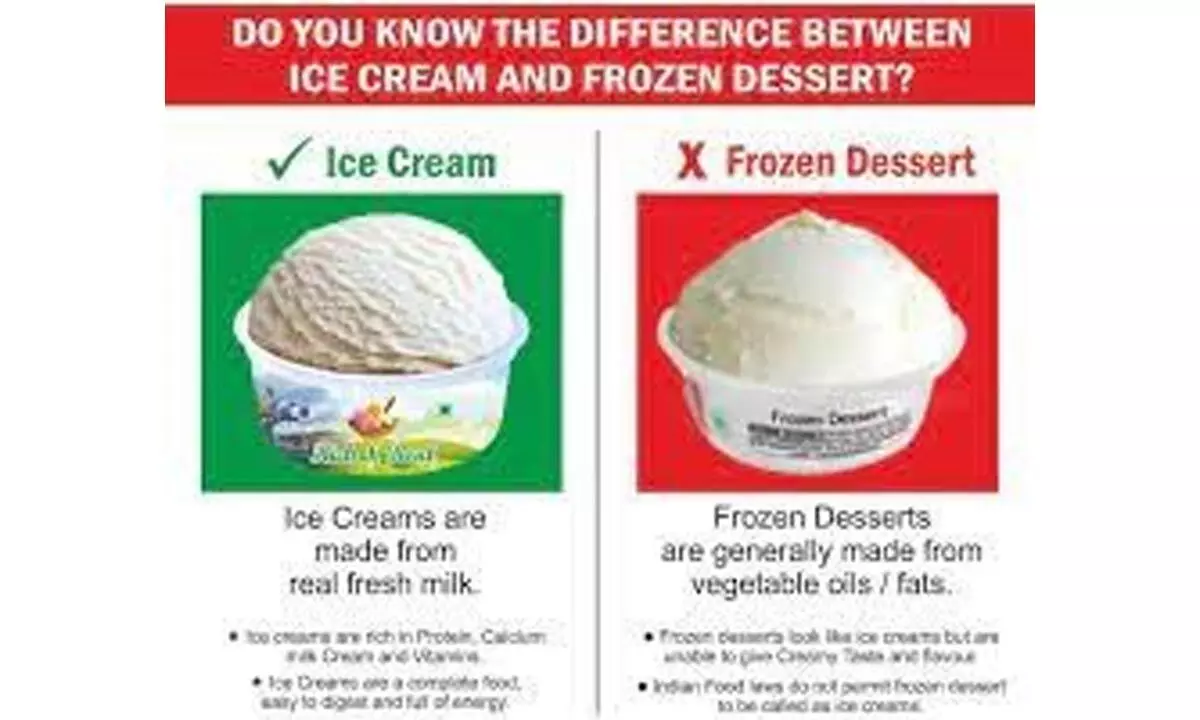Live
- MLA Yennam Leads in Vidya Nidhi Donations, Envisions Mahabubnagar as an Education Hub
- Session on Narrative Building Highlights India’s Changing Global Stance- Sood
- Garena Free Fire MAX Redeem Codes (11 January 2025): Unlock Free Diamonds, Skins, and More
- Mangalore lit fest Policy Reforms and Outdated Laws needed-Sanjeev Sanyal
- Makara -Mahotsav (Sankranti Sambaralu) and National youth day celebrations at Sphoorthy Engineering college
- ASHA Workers Secure Improved Pay and Benefits
- Police Arrest “Digital Arrest” Mastermind
- Puri Backs Energy Security Summit in Mangaluru, Calls for Wider Public Engagement
- Daku Maharaj Trailer Released: Balakrishna's Intense Performance as a Master of Killing Gives Goosebumps
- India’s Energy Sector Poised for Growth Amid Challenges: Hardeep Singh Puri
Just In
Hyderabad: Beware! Consuming 'frozen dessert' could be a health hazard


With the rising temperature, nothing can beat the taste of cool cold drinks, ice-creams or frozen dessert to alleviate the effects of the scorching heat.
Hyderabad: With the rising temperature, nothing can beat the taste of cool cold drinks, ice-creams or frozen dessert to alleviate the effects of the scorching heat. A majority of people are confused between ice-cream and frozen desserts, often thinking of the two to be synonymous with one another. They don't seem to realise that frozen desserts can be hazardous for health.
Most ice-creams people have been eating since childhood are actually frozen desserts. This might sound misleading but is actually true. The frozen desserts contain vegetable oil, especially palm oil, which is hazardous.
Many dieticians and nutritionists are of the opinion that using vegetable oils can prove to be detrimental to health. Many research studies have proved that palm oil consumption can increase blood cholesterol levels and lead to risk of cardiac diseases and cancers.
For the last few days several videos have gone viral on social media and messages claimed that markets are flooded with frozen desserts and not ice-creams.
The difference between ice-creams and frozen desserts is that ice-cream is made from dairy products, such as milk or cream, eggs, sugar, vanilla extract, and other flavours. The mixture is then churned into soft, creamy solids called ice-cream. Frozen desserts are made from vegetable oil, flour and sugar. They are often served cold and eaten straight out of the freezer.
According to a nutritionist, four types of oils--palm, palm kernel, coconut and sunflower--are used in frozen desserts to replace 50 and 100 per cent milk fat of vanilla ice-cream mixes. These oils increase the melting capacity and texture and viscosity of the food and desserts. They are a health hazard on overeating," said, nutritionist Dr Jaheerunnisa.
She said these oils increase the risk of cardiac diseases and cancers as they contain saturated fatty acids, such as palmitic, found in palm oil. They can promote the genes associated with tumor metastasis. This may increase the risk of cancers, like oral and skin, specially melanoma," she added.
A senior GHMC food safety officer said, as per the Food Safety and Standards Authority of India (FSSAI), a product can be labelled as ice-cream, kulfi or soft ice-cream when it is a mix made of milk or milk products. Those products which are made from a mix of milk fat and vegetable oils have to be labelled as 'frozen dessert'. Compared to frozen desserts, ice-creams have less fat and carbs. Ice-cream contains 5.6 gram of fat per 100 gm. On the other hand frozen dessert has 10.56 gram fat.
During each summer the GHMC Food Safety wing carries out inspections at ice-cream manufacturers and outlets, ice-gola stores, lassi and milkshake makers. Its officers inspect the products' labels, ingredients and declaration on the label.
An officer said "If one is found using frozen dessert ingredients and claim them to be ice-cream the product would be sent for lab testing. Following the results action would be taken."
He said the wing intensifies inspections in cases of adulteration of milk products, like ice-creams, softy ice-cream, lassi, buttermilk, and desserts.
Frozen desserts
Made of vegetable oil, flour and sugar and are often served cold and eaten when straight out of the freezer
Contain vegetable oil, especially palm oil, which is hazardous
Vegetable oils used in frozen desert can prove to be detrimental to health, say Dietitians
Palm oil consumption can increase blood cholesterol levels
Leads to risk of cardiac diseases and cancers
Four types of oils--palm, palm kernel, coconut and sunflower to replace 50 and 100 per cent milk fat of vanilla ice-cream mixes

© 2025 Hyderabad Media House Limited/The Hans India. All rights reserved. Powered by hocalwire.com






